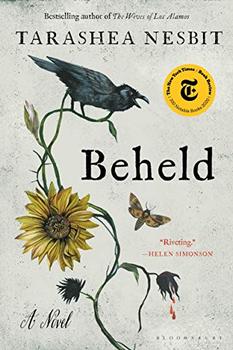Reading Guide Questions

Please be aware that this discussion guide will contain spoilers!
About this book
It begins with a killing. Ten years after the
Mayflower struck shore on rocky, unfamiliar soil, Plymouth is not the land its residents had imagined. The Billingtons—Anglicans, outsiders, and rebels—have just about had enough. And that's when a stranger arrives.
Beheld is about a murder and a trial; it's also an intimate, personal portrait of love, desire, motherhood, and friendship. The novel reframes the story of the pilgrims in historically under-recorded voices, asking whose stories get told over time, who gets believed, and who gets punished.
- In the first pages of the novel, Alice Bradford is anticipating the arrival of a ship. The passage is also full of foreshadowing. "Everything," says Alice, "could have been a sign of what was to come" How does foreshadowing work in the book? What expectations did you have as you read? What aspects of the story were still unexpected?
- Both John and Eleanor Billington regularly refer to the puritans of Plymouth as "hypocrites." What behaviors do the Billingtons see as hypocritical? Do you agree with their assessment?
- The novel is written in sections from the perspectives of different characters—primarily Alice Bradford, John Billington, Eleanor Billington, and John Newcomen. (The exceptions are discussed in Question 6.) The men's sections are narrated in the third person; the women speak themselves. What is the effect of having these different perspectives and different voices? Were there voices you trusted more than others? Do the characters ever differ on the facts, or is it only their interpretations that differ?
- There are a few sections from other perspectives as well—the sections headed "Meanwhile" (139), "Nature" (173), "The Diary of John Winthrop" (230), and "Dorothy" (221 and 234). What purpose do these other sections serve?
- Alice and Dorothy are very close as girls—"sisters," Dorothy says after they share the blood from their scraped knees (111). But over time, Alice feels them growing apart. To what do you attribute the changes in their friendship? Do you feel either woman is to blame? Or is the distance brought on by certain cultural expectations at the time for how women and girls should behave?
- Throughout the book, much goes unspoken about Dorothy's death. How is our understanding of her death complicated through the course of the novel? How do you make sense of it in the end?
- The conflict that leads to disaster in the novel is over a parcel of land. What is the significance of land for the colonists? What does it represent specifically for John Billington?
- Although the murder in the colony is a first, death is very common in these characters' lives, especially the death of infants and children. Religion—Anglican or puritan—is also important to their lives, and there is much discussion of God's tests, signs, and punishments. How do grief and faith shape these people? Do you see differences in the characters' personal relationships to God and religion?
- Part Three expands the novel's timeframe considerably. What is the effect of these leaps in time? How do you feel about Alice and Eleanor's fates?
- "If ever I beheld love, John, there was thee." These are the last words we hear from Dorothy (236). What do you make of this statement? And how do you interpret the title of the book? Who or what in the story is beheld—or beholden?
- The arrival of the Mayflower and founding of Plymouth Colony are familiar events in American history. Are there things you had learned—or assumed—about Plymouth and the puritans that the novel made you reconsider?
- Prior to reading the book, what did you know about the interactions between the puritans and the indigenous peoples of the Northeastern Woodlands, particularly the members of the Wampanoag Nation? Was there anything that surprised you upon reading the novel?
- The Author's Note in the back tells us about the research the author did to write this novel, as well as that several aspects of the novel were fabricated. What do you think the relationship should be in a historical novel between what can be verified and what an author imagines, particularly when much of the history of women, children, and people of color has been suppressed, ignored, or cannot—due to a lack of written records, for instance—be verified?
- How might the themes and stories of the book be relevant to our present moment?
Recommended Reading
Fiction:
The Wives of Los Alamos,TaraShea Nesbit;
Women Talking, Miriam Toews;
Counternarratives, John Keene;
I, Tituba: Black Witch of Salem, Maryse Condé;
A Mercy, Toni Morrison
Multi-genre:
Dawnland Voices: An Anthology of Indigenous Writing from New England edited by Siobhan Senier
Poetry:
WHEREAS, Layli Long Soldier;
Mother/Land, Cheryl Savageau
Nonfiction:
This Land Is Their Land, David Silverman;
Our Beloved Kin, Lisa Brooks;
Dissenting Bodies: Corporealities in Early New England, Martha Finch;
The History of White People, Nell Irvin Painter;
White Trash: The 400-Year Untold History of Class in America, Nancy Isenberg
Unless otherwise stated, this discussion guide is reprinted with the permission of Bloomsbury USA.
Any page references refer to a USA edition of the book, usually the trade paperback version, and may vary in other editions.

 Book Reviewed by:
Book Reviewed by:





